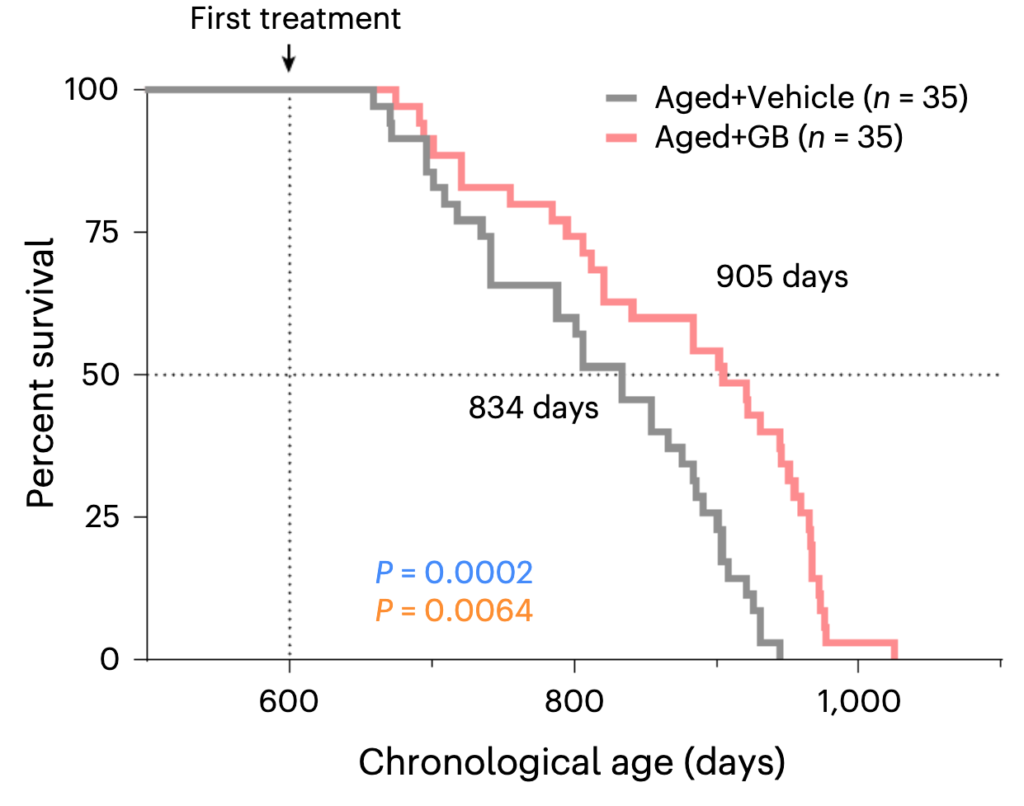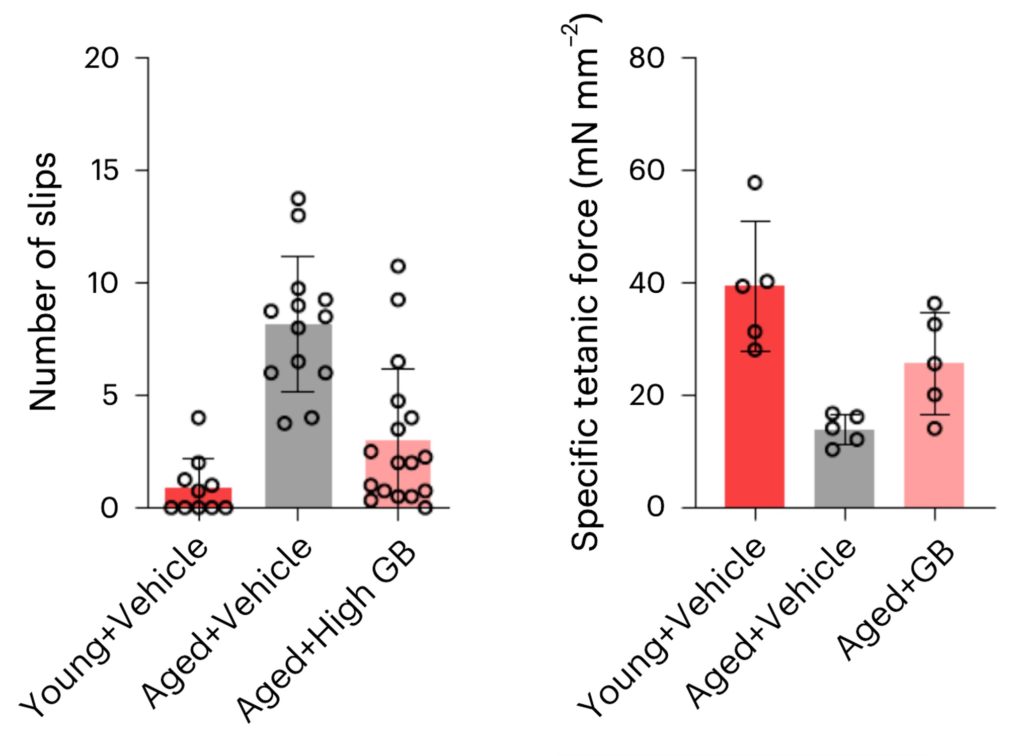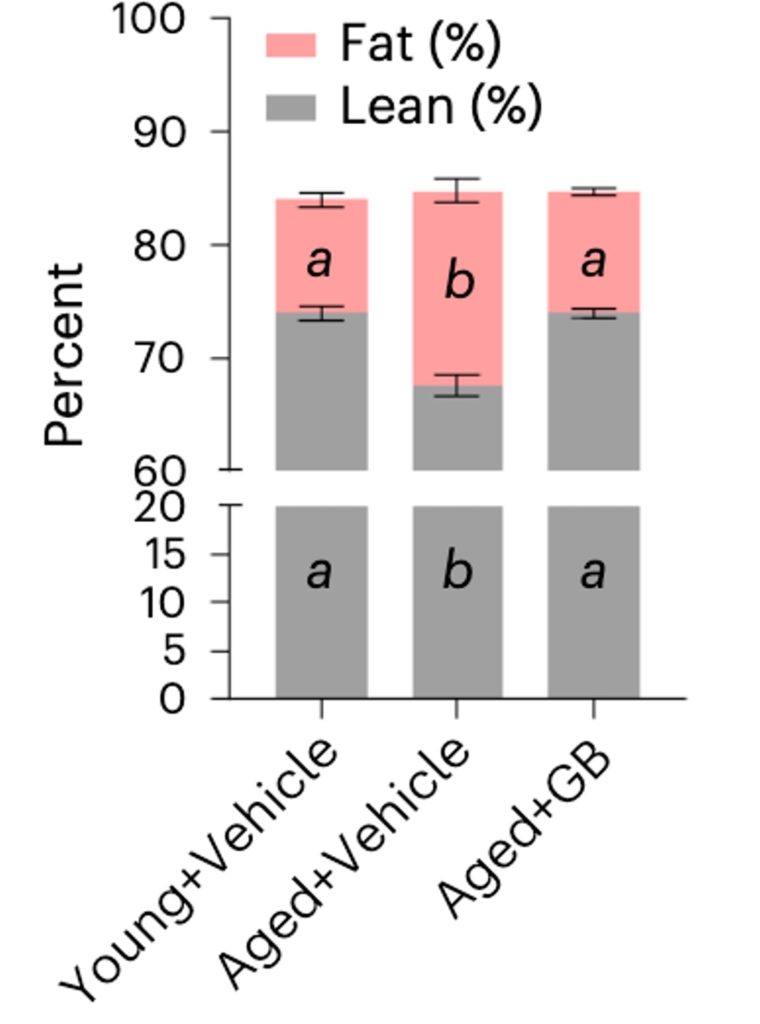Ginkgo Biloba Molecule Prolongs Life by Targeting Senescent Cells, New Study Shows
Ginkgolide B, a compound found in Ginkgo biloba tree leaves, prolongs lifespan, counteracts muscle loss, and rejuvenates body composition in mice.
Highlights
- Ginkgolide B prolongs the lifespan of mice by 8.5%.
- Ginkgolide B supplementation enhances strength and physical performance.
- Ginkgolide B reduces fat mass and increases lean mass.
Is it worth living a long life diminished by chronic disease? Studies have shown that anti-aging compounds can prolong the lifespan of worms, flies, and mice, but at what expense? Recently Lee and colleagues published a study in Nature Aging showing that a compound called ginkgolide B extends the lifespan of mice by 8.5%.

Other compounds like rapamycin — a prescription immunosuppressant drug — have also been shown to extend the lifespan of mice but with adverse effects such as insulin resistance, which can eventually lead to type 2 diabetes. Chronic diseases such as type 2 diabetes can profoundly reduce our quality of life.
The question is whether compounds like ginkgolide B can prolong lifespan while also maintaining healthspan — the duration of time we live without chronic disease. To explore the healthspan effects of ginkgolide B, Lee and colleagues assessed the physical features of ginkgolide B-treated mice that may contribute to improved quality of life.
Ginkgolide B Improves Strength and Mobility
An often-overlooked consequence of aging is a chronic disease called sarcopenia, characterized by a loss of muscle mass and strength in older individuals. Our muscles are what allow us to move. As such, sarcopenia can significantly reduce quality of life by impairing tasks such as walking and getting up from a seated position. Such impairments can lead to loss of independence and eventually death.
With this in mind, Lee and colleagues conducted an in-depth examination of how ginkgolide B affects age-related muscle loss in mice. Taking into account that muscle loss begins around the age of 35, the researchers fed ginkgolide B to mice aged 6 months, roughly equivalent to 30 human years. When the age of the mice reached approximately 35 human years, their muscle size and strength were measured. The results showed that ginkgolide B-fed mice had larger muscles and were stronger than mice not fed ginkgolide B, suggesting ginkgolide B can prevent or mitigate the onset of sarcopenia.
To determine if ginkgolide B could improve the healthspan of aged mice, the researchers fed ginkgolide B to mice with an equivalent age of around 60 human years. This led to improvements in muscle mass and strength, as well as physical performance, including hanging ability, balance, and coordination. Signs of muscle aging were also reduced, such as fat infiltration and scarring. Moreover, the ginkgolide B-fed aged mice had more small blood vessels and larger arteries, important for delivering the oxygen and nutrients needed to support muscle health.

“Muscle loss and functional decline in aging have been shown to be highly associated with all-cause mortality in various studies. For example, multicenter cross-country studies have indicated that muscle weakness, such as grip strength and fatigue recovery, can serve as a predictor of morbidity and mortality in the general population, surpassing the predictive power of systolic blood pressure. Thus, maintaining muscle mass and function is likely to be more critical for overall health and longevity in aging individuals,” say the authors.
Ginkgolide B Improves Body Composition and Metabolic Health
By their own self-assessment, individuals with obesity tend to have a lower quality of life, encompassing physical ailments such as pain and mental ailments such as depression. Obesity is also a significant risk factor for early death, cardiovascular disease, diabetes, and cancer. Lee and colleagues found that ginkgolide B therapy reduced the fat mass and increased the lean mass of aged mice, demonstrating improvements in body composition that run counter to obesity. Ginkgolide B treatment also returned blood triglyceride and cholesterol levels to youthful levels while improving glucose metabolism.

Ginkgolide B Counteracts Frailty, Inflammation, and Senescence
Two individuals can be the same age but one can be more vulnerable to adverse health outcomes than the other. In this case, the more vulnerable individual is considered frail. Frail individuals have higher mortality rates than fit individuals and frailty reduces quality of life. The frailty index is an assessment of overall health, encompassing measurements of multiple organ systems. In mice, this involves 31 measurements, including, loss of fur color, tumors, grip strength, and vision loss.
Lee and colleagues found that the frailty index score of aged mice was higher than that of young mice, indicating that the aged mice were frailer. They showed that aging increased 22 of the 31 frailty measurements. However, ginkgolide B treatment reduced the frailty index score by 65% and reversed 19 of the frailty measurements. Moreover, ginkgolide B reduced markers of inflammation, one of the major contributors to frailty.
Senescent cells are a major driver of aging, as they promote inflammation and impair healthspan and life expectancy. Lee and colleagues revealed that ginkgolide B reduced senescent cell markers in multiple organs, suggesting that ginkgolide B alleviates senescence burden in aged mice. Additionally, ginkgolide B reduced tumor incidence and mitigated organ impairments, which are associated with senescent cells and inflammation. These findings suggest that ginkgolide could improve quality of life and healthspan by reducing senescence.
Can Ginkgo Biloba Extract Generate the Same Benefits as Ginkgolide B?
Ginkgolide B is a bioactive compound found in Ginkgo biloba extract called a terpene lactone. Most studies examining Ginkgo biloba extract focus on this lactone, other lactones, and flavones because they are the primary active compounds in Ginkgo biloba extract. However, other compounds found in Ginkgo biloba extract, namely protocatechuic acid, have been shown to provide a synergetic effect against neurodegeneration in Parkinson’s disease models when combined with ginkgolide B.
Considering the possible synergistic effects of the compounds contained within Ginkgo biloba extract, it may be advantageous to supplement with the extract as a whole rather than its individual components. Still, the concentration of specific components will be lower in the whole extract, and it will be difficult to determine the exact dose of each component. With that being said, no standard dosage regimen has been established.
Furthermore, according to the Mayo Clinic, more research is necessary to determine if Ginkgoko biloba extract can treat specific conditions, such as dementia, even though some evidence suggests that it may improve memory in healthy adults. Similarly, whether Ginkgo biloba extract or ginkgolide B can prolong lifespan will require more evidence. Side effects of the extract include headache, dizziness, heart palpitations, and allergic skin reactions.
Notably, Lee and colleagues found that overexpression of a gene called Runx1 contributed to muscle senescence, which has also been shown in older adults with sarcopenia. They showed that ginkgolide B, at least in part seems to work by reducing Runx1 activity. Interestingly, resistance exercise has been shown to reduce Runx1 activity, suggesting that exercise could have similar effects to ginkgolide B.
Model: Female C57BL/6 mice
Dosage: 12 mg/kg ginkgolide B

